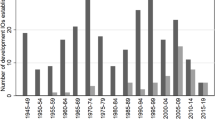Abstract
Half a decade after the euro crisis, the European Union is in dire need of a growth strategy that is economically viable, politically legitimate and seen as socially fair. The United Kingdom’s fateful choice for Brexit has given new urgency to this imperative. While it is deplorable to lose a strong political force behind the internal market, Britain’s decision to leave the EU does create a window of opportunity for taking the Union’s “social market economy” ambitions, as laid down in Articles 2 and 3 of the Lisbon Treaty, more seriously than before.
Similar content being viewed by others
Author information
Authors and Affiliations
Corresponding author
Additional information
This article extensively builds on the analysis originally advanced in the monograph A. Hemerijck: Changing Welfare States, Oxford 2013, Oxford University Press and in my more recent articles on the euro crisis and the economics of social investment. Comments by Gerda Falkner, Maurizio Ferrera, Frank Vandenbroucke and Simon Vydra are gratefully acknowledged.
Rights and permissions
About this article
Cite this article
Hemerijck, A.C. Making Social Investment Happen for the Eurozone. Intereconomics 51, 341–347 (2016). https://doi.org/10.1007/s10272-016-0632-9
Published:
Issue Date:
DOI: https://doi.org/10.1007/s10272-016-0632-9



